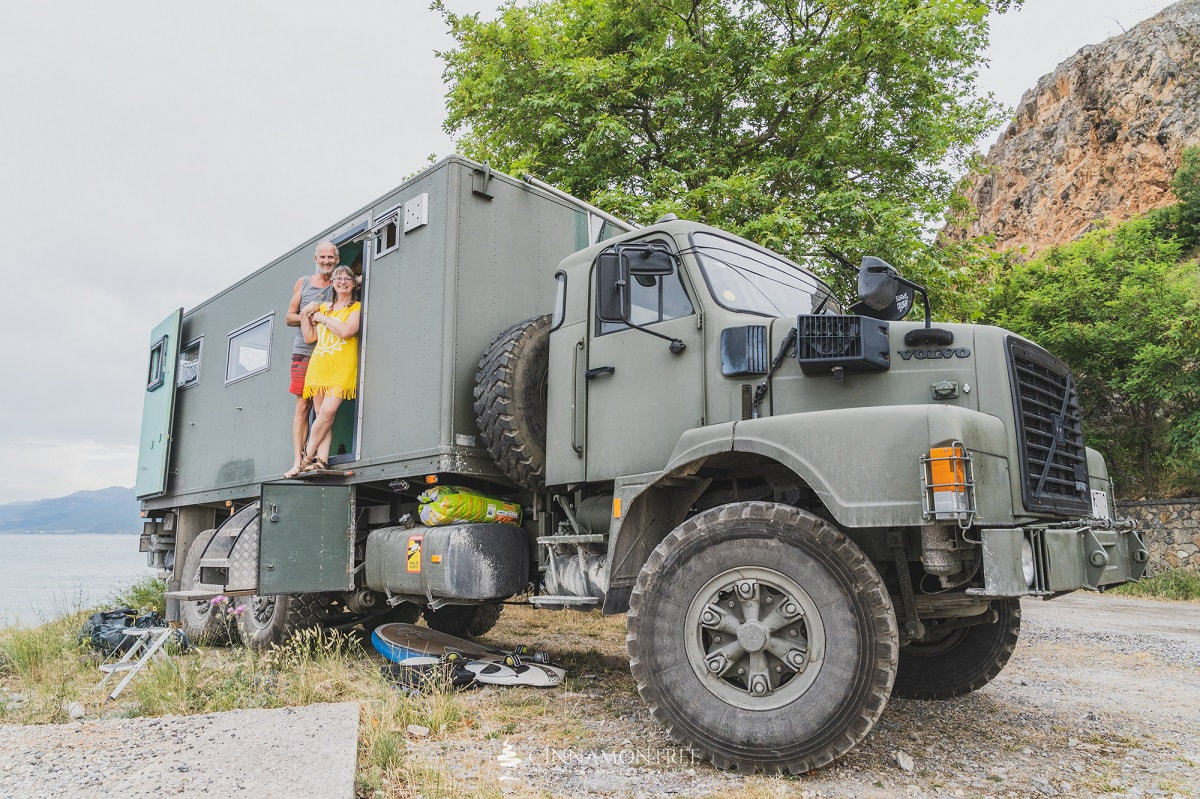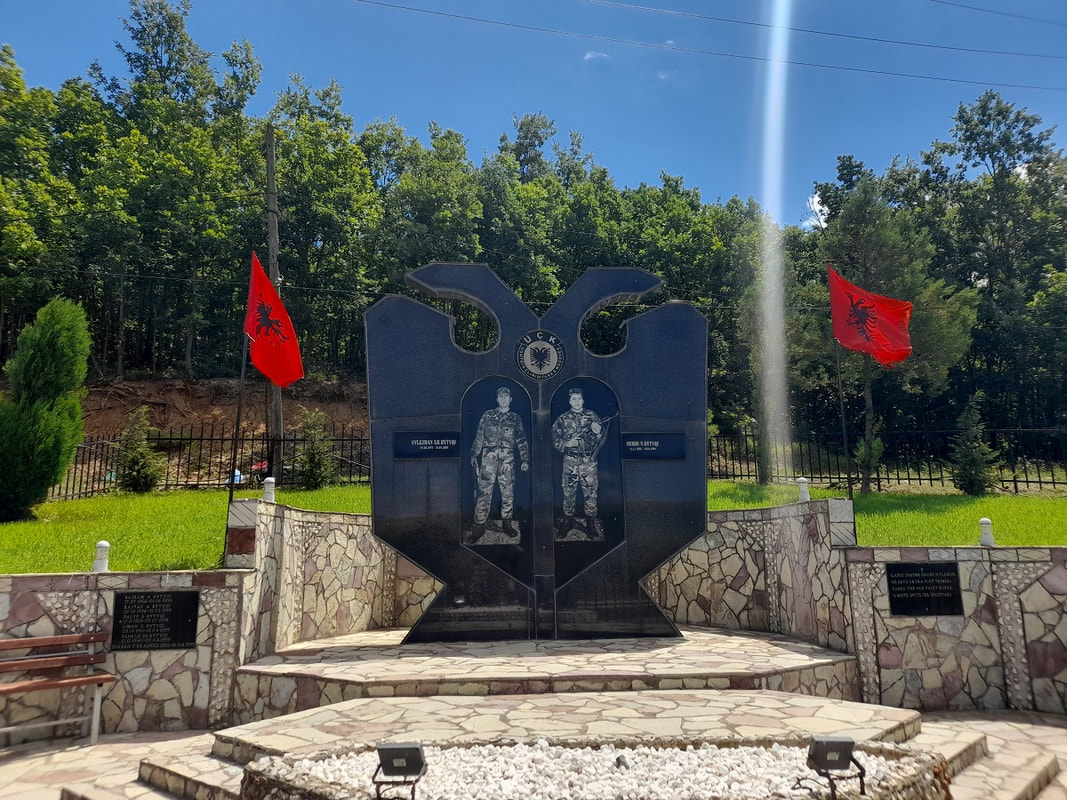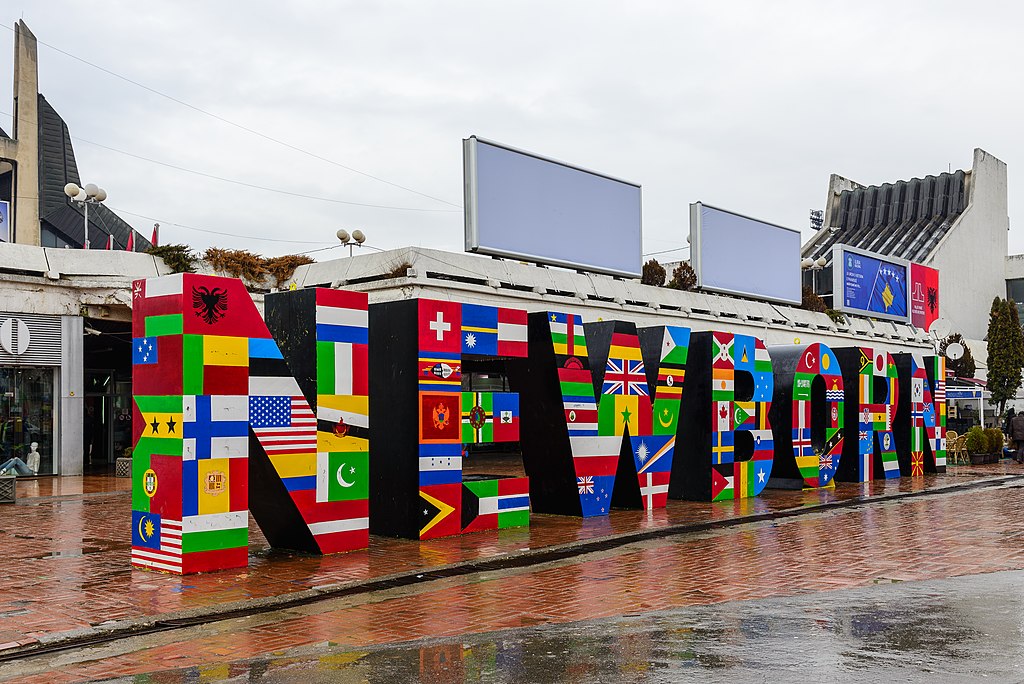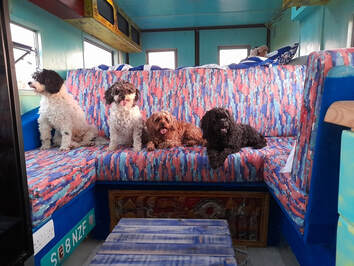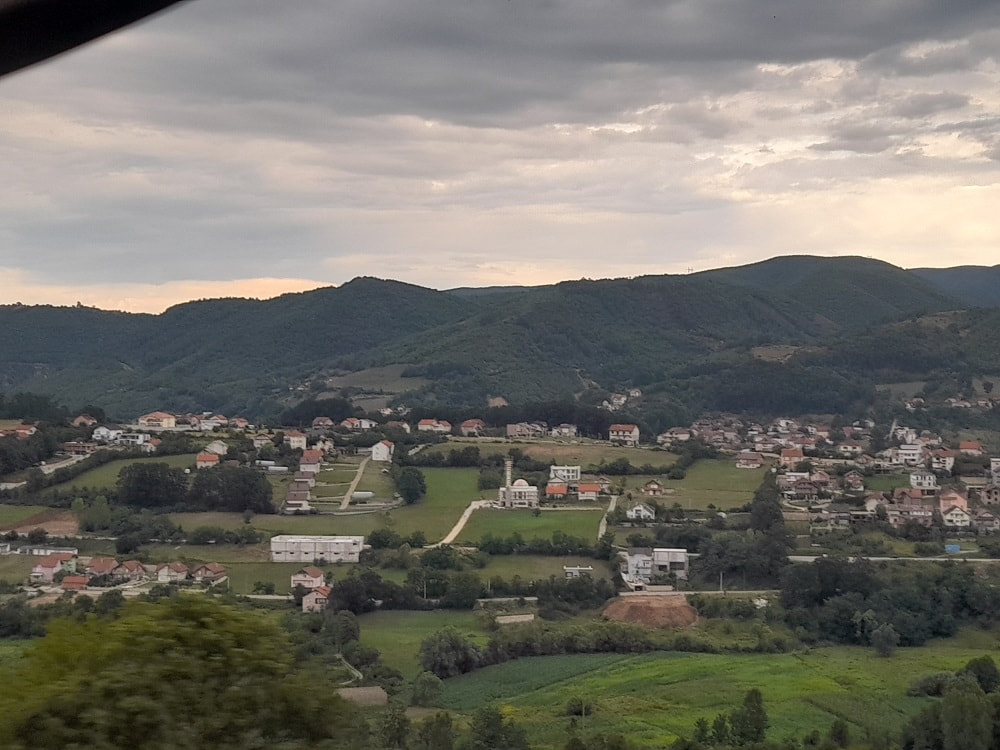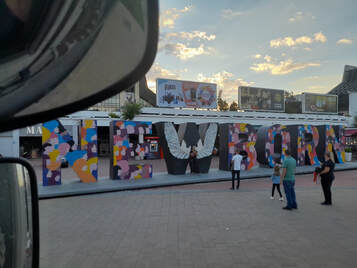Welcome to Kosovo by Jackie Lambert
Hungerford. Lockerbie. Dunblane.
Sleepy backwaters whose syllables might have languished in obscurity forever, had they not become intertwined irrevocably with tragedy.
I felt the same as we crossed into Kosovo. My knowledge of Europe’s newest country – a territory half the size of Wales, populated by fewer than two-million people – derived mostly from shocking news bulletins during the 1990s. In my mind, Kosovo and its capital, Pristina, were synonymous with atrocities. Tales of massacres, genocide and ethnic cleansing in the lead up to and during the Kosovo War of Independence of 1998-1999.
The customs guy welcomed us into his country. Tall, slim and authoritative, he looked sternly down his Roman nose as he beckoned us into a layby and demanded of my husband, Mark,
“Dock-oo-ments!”
Customs officials are notoriously humourless. He caught my eye. Without thinking, I smiled at him. He smiled back.
“Insurance!” he barked, without looking up from his inspection of our passports.
“I need to buy border insurance,” Mark replied.
“Over there!” he waved his arm dismissively, but when Mark returned with the insurance he said, “You’re a very lucky man!”
Mark told me later, “I thought he was going to refuse the certificate because I got ‘special camping vehicle insurance’, which cost €15 for 15 days. He told me, ‘That should have been €100 for your truck!’”
We travel in The Beast, a 30-year-old, 26-tonne Volvo N10 army lorry, which we converted into our new home during the coronavirus lockdown. The customs guy called over his colleague and they both had a good look inside. Not to catch us out, but because they were interested.
“It’s a great car!” he beamed as he clambered down the steps of our home on wheels.
He noticed The Fab Four, our fur babies, sitting in the cab, but he didn’t demand their doggie passports. Instead, he shook paws with every one of them.
“I have a Malteser at home!” he told us proudly. Grinning from ear to ear, he explained how his fluffy white fur ball rushed to the door every evening to welcome him home.
And with that, we entered Kosovo.
Our original destination, the country’s historic capital of Prizren, was a few hours’ drive through the mountains. Long delays and a few hiccups on the North Macedonian side of the border meant it was already 6 p.m. We’re not big city people, but the modern-day capital of Pristina was considerably closer, so despite our reservations, we set our course for there instead.
“Can you look up a campsite on the phone?” Mark asked.
“I can’t,” I replied. “There’s no mobile signal.”
We were driving through a chequerboard of fields and small villages, surrounded by rolling hills. It reminded me of Merrie England with minarets.
“The service should kick back in once we’re nearer the city.”
It didn’t.
Then, The Beast’s battery light came on, and she lost power to all her electrics. Suddenly, we found ourselves approaching a capital city with no speedo, no rev. counter, no temperature monitor, no lights, and no indicators. En route, there was nowhere to pull over, although in any case, there was nothing around. We didn’t want to switch off the engine only to find it wouldn’t restart. With 24-volt electrics, The Beast is not a conventional jump start and, despite being ten tonnes below her maximum weight, a sixteen-tonne push is out of the question. The other minor detail was that we had entered the Euro zone. The ATMs we’d found in North Macedonia only dispensed Denars, so besides having no electrics, we didn’t have a cent to our name!
If you’re looking for an adrenaline rush, I can recommend driving a ten-by-four-metre military truck through several lanes of traffic in the centre of Pristina with no indicators and no real idea of where you’re going. In a brief 4G moment, my Park4Night app rewarded me with a glimpse of a potential park-up near a sports stadium. I tried to memorise the location. We headed there hoping my memory, which regularly fails to recall a twenty-six-year-old PIN, was less flawed than normal.
First, we needed to find the stadium. We took a few wrong turns, then followed a road that narrowed rather menacingly to give us a centimetre to spare on either side of our 2.5 metre width. We saw several angry, muscle-bound stray dogs scavenging around bins, but no sign of a park-up. A French couple gave The Beast the thumbs up as we passed. They shouted,
“Great car! You looking for parking? We parked our camper down there.”
‘Down there’ was a dank and mossy swathe of waste ground next to the stadium, overgrown with scrubby trees. It accommodated a derelict, half collapsed building smeared with black mould, piles of trash, and two even larger and more fearsome strays. A hand-painted sign, which looked like it could have been daubed in blood, pronounced €2 for 8 hours parking. At least that seemed quite reasonable.
“My friend! My friend!” A young lad in a hoodie shot over to our open window. “Park here!”
He directed us into a gap between a tree, the falling-down building, the trash, and the dogs. “How long you stay?”
It was 7 p.m. and we surveyed our dystopian surroundings with the eyes of beggars who can’t be choosers.
“Just until morning,” Mark replied.
“You see, my friend, I could park eight cars here. You are very big. It will cost you twenty euros.”
His words initiated a flashback to the stunning campsite where we had stayed in Shkodër, Albania. A green oasis of manicured lawns and shady vines surrounding a circular turquoise jewel of a swimming pool, with views of a medieval hilltop castle.
“Camping Legjenda was one of the best campsites we’ve ever stayed in,” I said to Mark, “and even that cost only €17 per night.”
Suddenly, the beggars made a choice and left.
“It will be fine!” Mark said, with all the optimism of someone who had not been blessed with short but depressing glimpses of the Park4Night app. Fleeting moments of connectivity revealed that Kosovo doesn’t really have any campsites. That there were no other park-ups around. Of course, that was partly why we were there. We like to avoid the crowds, although our strategy can have its down sides!
I had a headache from lack of food. Lunch had been an ice cream in North Macedonia’s capital, Skopje – and we still had no money, remember?
Another wrong turn off the motorway left us heading back to the centre of Pristina. On the positive side, our electrics were restored – the immobiliser seemed to have malfunctioned and re-set itself. As we did a U-turn around a roundabout, I shouted out,
“There’s a bakery. And an ATM! Pull over there…”
Mark stopped outside a 24-hour funeral service and returned with a wad of Euros, a fresh loaf, and a Burek – a filled pastry that is a popular snack in the Balkans. On the cash and stomach front, at least, things were looking up.
We continued out of the city, which was uniform and regimented; all smooth white concrete. I guessed it had been flattened in the war and rebuilt. We passed Bill Clinton Boulevard and the Newborn monument – seven oversized letters that spell out the rebirth of a nation. Every year on the anniversary of Kosovo’s independence, they are painted different colours.
As dusk descended, Mark didn’t make me feel any better when he said,
“See those mountains? That’s where we’re heading.”
Just what I wanted to hear. Winding mountain roads. In the dark. With nowhere to go.
At least I knew that in the decades since the war, they had cleared landmines from most major routes. Even so, chilling monuments lined the roadsides. In most countries, you might see an occasional memorial, where vehicles with a need for speed failed to round a bend, or an impatient motorist mowed down a pedestrian. In Kosovo, every few miles, there were small roadside graveyards to accommodate civilian casualties, with plaques to commemorate military personnel. Albanian flags adorned them all. We barely saw a Kosovan flag.
My park-up antennae went into overdrive. I made mental notes of service stations with truck stops, and pizza restaurants with large parking lots. Then, in another brief 4G moment, a restaurant flashed up on Google Maps. As we drove towards it along a minor road, we spotted a café with a spacious car park and decided that would do nicely. It was nearly dark, and I can’t tell you how relieved I felt.
An impossible conversation in Albanian and English followed, where the owner conveyed that it was fine to park, but they had no outside seating area and dogs were not allowed inside the restaurant. We might have explained that we had to feed our poor little starving puppies first, then would come in for something to eat.
We abandoned the newly fed Fab Four in the truck for the first time ever, and chose a table with a clear view of The Beast to keep an eye on them as best we could.
“Can we order some food?” we asked.
“No.” came the answer. It was 9:02, so I suspect the kitchen had just closed.
We sat down with a much-needed beer and a few minutes later, an immense Greek salad appeared, sprinkled with delicious, salty white cheese.
“This is from us!” the waiter said. “On the house.” He also brought a carrier bag filled with chunks of fresh bread. “For the dogs.”
Three gentlemen enjoying alcohol-free beer at the next table chatted to me in German, our only common language. Two more beers arrived.
“This is from them!” our waiter explained.
“Gazua!” we raised our glasses. At least we knew how to say “Cheers” in Albanian. And “falaminderit” – thank you. They left before we could reciprocate.
Then, a chap who had been sitting in the corner came over and said in halting English, “Can I have a photo with you?”
“Of course!” we said, and asked the waiter to take a picture with our phone too.
“I’m Pavel,” he said as we invited him to join us.
Two more beers arrived as Pavel welcomed us to Kosovo.
“Do you like my country?” he asked.
“We’ve only been here for two hours,” we told him, “but we can honestly say it’s even more friendly than Albania, and that’s the friendliest country we’ve ever visited!”
“The Kosovans are beautiful people,” he told us.
We chatted for hours. He called his daughter to speak to us in English, but the connection thwarted us.
“The phone service is sh**!” he said. “There is nothing here. No work. The youngsters move away.”
Aha. The other side of the migration coin. The one that most xenophobes fail to consider.
Migration needs to be controlled not only because of the resentment caused by an influx of hard-working people taking the locals’ jobs – albeit usually low-paid jobs that locals don’t want. The real problem with uncontrolled migration is that it decimates the poorer countries, who lose their brightest and best to larger, more successful economies.
Pavel told us it was his birthday. He refused our offer of a celebratory beer and bought us another round. He was a handsome, silver-haired man in his early fifties. Although he had lived through the troubles, he had kind eyes, with laughter lines crinkling the corners.
In a few paragraphs, I can’t hope to summarise millennia of convoluted history in a disputed territory, but in a nutshell, the Serbs came to Kosovo in the 7th century. By the middle-ages, Kosovo was the centre of their Empire, and is home to many important Serbian Orthodox religious sites. To the Serbs, Kosovo is a fundamental part of their heartland.
But in 1389, Ottoman forces defeated the Serbs. Turks and Albanians settled in Kosovo and ultimately, Albanians became (and remain) the principal ethnic group.
Fast forward five hundred years to the early 1900s. Serbia regained control of Kosovo and created a Serbian province with an Albanian majority. Albanians comprise 80 to 95 percent of the population, depending on who you ask. Albanian is still the most widely spoken language in Kosovo.
In 1945, following WWII, Kosovo became part of the Socialist Federal Republic of Yugoslavia, then in 1974, claimed its independence. This didn’t last. In the early 1990s, Yugoslav President, Slobodan Milosevic, removed Kosovo’s autonomy.
We saw the letters UÇK everywhere – even carved into one chalk hillside, like Uffington’s famous white horse. UÇK stands for Ushtria Çlirimtare e Kosovës; the Kosovo Liberation Army, which came into being to resist violence and repression of Kosovan Albanians by the Serbian state. By 1998, the conflict between Serbian forces and the UÇK was so brutal that NATO intervened against Serbia on behalf of Kosovo. Kosovans credit former US President Bill Clinton with spearheading the action, hence Pristina’s incongruous ten-metre statue and boulevard dedicated to America’s 42nd president.
In 2008, Kosovo declared its independence, although this Newborn nation is not universally recognised. Obviously, Serbia does not acknowledge its existence, but among many other countries, Russia and China, and five European Union (EU) countries (Spain, Greece, Cyprus and Balkan neighbours Romania and Slovakia) still view Kosovo as illegally seceded Serbian territory.
On the fifth anniversary of independence, the Newborn monument in Pristina was painted with the flags of all the countries who recognise Kosovo as an independent sovereign nation.
Although the EU and UN (United Nations) recognise Kosovo, Russia and China used their veto to deny Kosovo UN membership.
Those are the broad strokes of history, but Pavel explained a little more about the boiling pot of ethnic tensions that is The Balkans.
“I am Muslim,” he said, “but the Serbian and Bosnian Muslims hate me because I drink beer. They think I am not a proper Muslim. Albania, Montenegro and Kosovo are friends, but I cannot love Serbians, Bosnians, and Macedonians.”
This was not mindless hatred.
On his phone, he showed us a picture of a memorial in his village. A wall emblazoned with rows and rows of photographs. “One of the massacres took place in my village,” he said. “Okay, they killed men, but women? Children? Why? Why?”
They say ‘time is a great healer’. They say ‘forgive and forget’. They say ‘let bygones be bygones.’
Serbian forces murdered twenty-seven members of Pavel’s family, including his mother, father and sister.
How can you ever forgive that?
When our bill came for the evening, it was €2.
Pavel was insistent. He paid it, along with a little extra for us to have a coffee in the morning.
“You are guests in my country!” he said. “You don’t pay. You are welcome in my house. I give you my number. You call me. If you have any problems, you call me. From Macedonia. From Montenegro. You call me and I will help!”
And that was our welcome to Kosovo.
Our encounter with Pavel was interesting because his account of who was friend and who was foe didn’t fully match our understanding of the relationships between Kosovo and her neighbours. Yet, who are we to question someone who lived through the reality? And who knows if our historical sources are accurate, or apply to every local situation?
I have relayed our conversation as it was told, but other voices might well recall things differently. The only thing I have changed is Pavel’s name, to preserve his privacy.
|
Albania Lake Ohrid Lin J&M with Beast
Kosovan Roadside Memorial with Albanian Flags
Newborn Pristina February 2013 (Arild Vågen, CC BY-SA 3.0 <https://creativecommons.org/licenses/by-sa/3.0>, via Wikimedia Commons)
|
Fab Four Inside The Beast
Kosovo - Merrie England with Minarets
Newborn Pristina July 2022
|
